- Points Based
- Most people below the age of 51 years old, with an occupation (listed on each country’s list), 2+ years of work experience & good English / French are eligible for this
- It is the most popular way of settling overseas

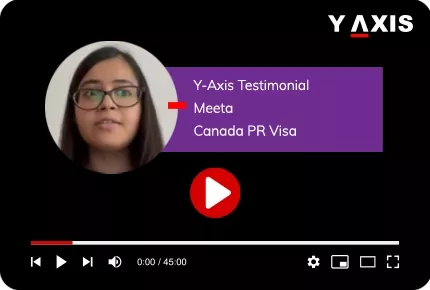
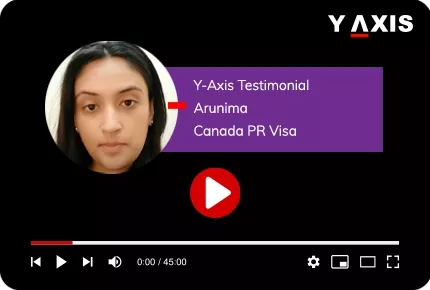
Germany Job Outlook, Germany Work Visa, Work in Germany, Job market in Germany for foreigners, High demand jobs in Germany for foreigners, Germany skilled worker list, Germany work visa eligibility 2025, Germany work visa cost, Germany work visa processing time, Germany work visa requirements
Discover the Germany Job Outlook for insights on in-demand sectors, high salaries, work visas, and benefits for UAE workers seeking opportunities.
Germany Job Outlook for UAE Professionals
Germany is a popular work abroad destination for skilled international professional from around the world, especially those coming from the UAE. Being Europe's biggest economy, it has plenty of job opportunities in various fields. The country is all about innovation and sustainability, and there’s a growing need for skilled workers. For professionals from the UAE looking to grow their careers in Europe, Germany offers a great work atmosphere, high living standards, and lots of chances to develop your career.
- By 2026, Germany is set to add about 1.2 million new jobs.
- Jobs in tech, like data scientists, software developers, and cybersecurity experts, are expected to grow by about 10-12% each year.
- The healthcare field will grow by 15% since the population is getting older.
- Skilled trades, like electricians and plumbers, will see an 8% increase, thanks to demand in construction and manufacturing.
- Germany's unemployment rate is really low, sitting around 3.5% in 2025.
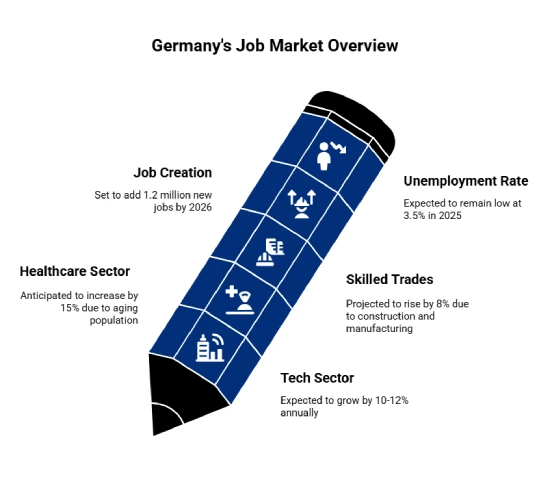
*Want to apply for Germany Work Visa? Y-Axis is here to guide you with the process.
Why Consider Working in Germany?
Working in Germany has a lot to offer, like a stable economy, great quality of life, and good job growth, making it a top choice for professionals. Here’s why so many people are drawn to work there:
- Strong Economy and Job Security: Germany has one of the strongest economies around, which means solid job security and fair treatment for workers.
- High Quality of Life: The country consistently ranks well for living standards, featuring excellent public services, transportation, and healthcare. There is a strong emphasis on work-life balance, with reasonable hours and ample vacation time.
- Career Growth and Skill Development: As a leader in innovation, Germany boasts many industries like engineering, IT, and healthcare, all offering chances for career growth.
- International Work Environment: Germany’s diverse workforce creates a welcoming environment where you can learn from different cultures and perspectives.
- Good Salaries and Benefits: Employees enjoy competitive pay and solid benefits like health insurance and pension plans, adding to their financial security.
- Gateway to Europe: Its central location in Europe makes it an easy starting point for traveling and connecting with other countries.
Germany Job Market Trends
Germany's job market is looking good in 2025. There's a big push towards digital changes, green tech, and a shortage of skilled workers, which means more jobs for professionals.
- Tech: Jobs in data science, AI, and cybersecurity are booming.
- Engineering: Mechanical, electrical, and civil engineers are really wanted.
- Healthcare: With more older people, there's a growing need for doctors, nurses, and medical techs.
- Skilled Trades: Electricians, plumbers, and HVAC techs are key for construction and infrastructure work.
- Finance: Financial analysts and auditors are also becoming more popular.
Most In-Demand Occupations in Germany
In Germany, a lot of industries are looking for skilled workers. The main ones are IT, healthcare, engineering, and trades. Jobs like software developers, nurses, doctors, and engineers are really in demand. There's also a good need for roles in sales, marketing, logistics, and construction.
Healthcare Sector
Germany's healthcare sector is set to keep growing because of the aging population. Some in-demand jobs include:
| Job Role | Average Annual Salary (EUR) |
|---|---|
| Specialist Doctor | €60,000 – €150,000 |
| General Practitioner | €50,000 – €80,000 |
| Registered Nurse | €40,000 – €60,000 |
| Physiotherapist | €40,000 – €70,000 |
| Pharmacist | €45,000 – €80,000 |
| Medical Laboratory Technician | €35,000 – €55,000 |
| Radiologist | €80,000 – €120,000 |
| Healthcare Manager | €70,000 – €100,000 |
| Medical Sales Representative | €50,000 – €80,000 |
| Occupational Therapist | €45,000 – €70,000 |
Information Technology (IT)
With digitalization, the jobs roles in the IT sector are popular in Germany.
| Job Role | Average Annual Salary (EUR) |
|---|---|
| Software Developer | €50,000 – €100,000 |
| Data Scientist | €60,000 – €120,000 |
| Cybersecurity Analyst | €55,000 – €110,000 |
| Cloud Engineer | €60,000 – €110,000 |
| AI Engineer | €65,000 – €130,000 |
| IT Project Manager | €60,000 – €100,000 |
| Network Engineer | €50,000 – €90,000 |
| Business Intelligence Analyst | €50,000 – €90,000 |
| UX/UI Designer | €50,000 – €85,000 |
| DevOps Engineer | €60,000 – €110,000 |
Engineering
Germany's industries and infrastructure are doing well, creating a need for engineers.
| Job Role | Average Annual Salary (EUR) |
|---|---|
| Civil Engineer | €55,000 – €80,000 |
| Mechanical Engineer | €50,000 – €75,000 |
| Electrical Engineer | €50,000 – €80,000 |
| Project Manager (Construction) | €70,000 – €110,000 |
| Architect | €60,000 – €95,000 |
| Structural Engineer | €55,000 – €85,000 |
| Quantity Surveyor | €50,000 – €75,000 |
| Construction Manager | €60,000 – €95,000 |
| HVAC Engineer | €50,000 – €75,000 |
| Building Services Engineer | €50,000 – €75,000 |
Skilled Trades
Germany’s manufacturing and construction industries are in need of skilled workers like:
| Job Role | Average Annual Salary (EUR) |
|---|---|
| Electrician | €35,000 – €50,000 |
| Plumber | €30,000 – €50,000 |
| Welder | €35,000 – €50,000 |
| HVAC Technician | €30,000 – €50,000 |
| Mechanic | €30,000 – €45,000 |
| Carpenter | €35,000 – €50,000 |
| Heavy Equipment Operator | €40,000 – €60,000 |
| Construction Laborer | €30,000 – €45,000 |
| Painter | €30,000 – €45,000 |
| CNC Machine Operator | €40,000 – €60,000 |
Finance and Accounting
As financial markets keep expanding, jobs in finance are on the rise.
| Job Role | Average Annual Salary (EUR) |
|---|---|
| Financial Analyst | €50,000 – €80,000 |
| Chartered Accountant | €60,000 – €100,000 |
| Investment Banker | €70,000 – €130,000 |
| Tax Consultant | €60,000 – €100,000 |
| Auditor | €55,000 – €90,000 |
| Risk Manager | €60,000 – €120,000 |
| Financial Planner | €50,000 – €80,000 |
| Credit Analyst | €50,000 – €80,000 |
| Chief Financial Officer (CFO) | €100,000 – €150,000 |
| Treasury Manager | €60,000 – €100,000 |
Germany Work Visa Options for UAE Citizens
There are multiple options for Germany Work Visa for international professionals, including:
- EU Blue Card
- Skilled Worker Visa
- Germany Opportunity Card
- Intra-Company Transfer Visa
- Freelance Visa
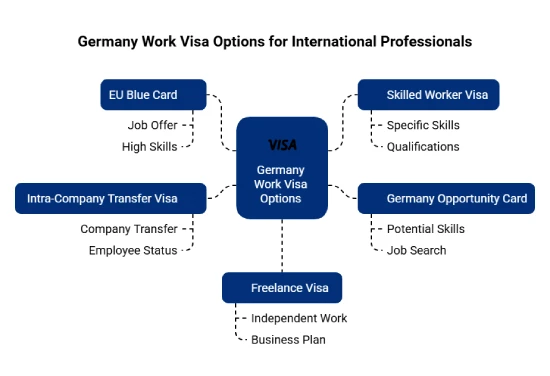
EU Blue Card
The EU Blue Card makes it easier for skilled workers from outside the EU to get a German work visa. It gives a clear path to permanent residency, helps with bringing family members over, and lets you travel around the Schengen area. Basically, it’s a permit that lets non-EU citizens live and work in Germany if they have a university degree and a job offer with a good salary.
Skilled Worker Visa
The Germany Skilled Worker Visa, or the Skilled Immigration Act, lets qualified folks from outside the EU work in Germany. To get this visa, you need to show you have a recognized vocational training or a university degree, plus a job offer from a German employer. This visa is meant to bring in skilled workers to help fill job gaps in Germany.
Germany Opportunity Card
The Germany Opportunity Card is a new immigration pathway designed to attract highly skilled workers to Germany. It provides an easier route for professionals with qualifications in sectors facing skill shortages, such as IT, healthcare, and engineering. The card offers greater flexibility in finding a job, with a points-based system that assesses education, work experience, language skills, and age.
Intra-Company Transfer Visa
The Germany Intra-Company Transfer (ICT) Visa, also known as the ICT card, is a residence permit that allows employees of international companies to be temporarily transferred to a German branch or subsidiary. It's designed for managers, specialists, and trainees who are being seconded to Germany for a specific period
Freelance Visa
The Germany Freelance Visa, also known as the "Residence Permit for Freelance Activity" or "Freiberufler" visa, allows self-employed individuals to live and work in Germany, including those in "liberal professions" like artists, writers, and certain consultants. It permits freelancers to collaborate with various clients and potentially establish a business in Germany. The visa can be a stepping stone to permanent residency after 3-5 years.
Eligibility Criteria for Germany Work Visas
The eligibility criteria for Germany Work Visas are given below.
- Job Offer: You need a real job offer from a licensed employer in Germany.
- Qualification: A bachelor's degree or vocational certification that matches the job.
- Experience: Usually, you’ll need about 2-5 years of relevant work experience.
- Language Skills: Some basic German skills (A1 or A2 level) might be necessary.
- Health Insurance: You must have health insurance that's accepted in Germany.
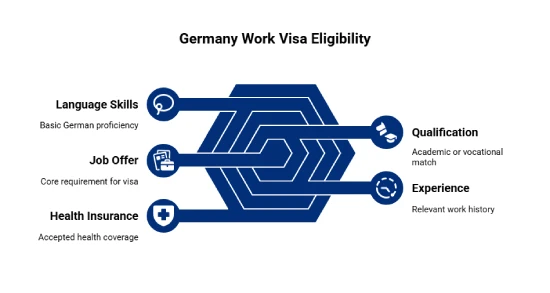
Required Documents for Germany Work Visa
The documents required to apply for Germany Work Visa are given below.
- A valid passport that's good for at least 6 months.
- A job offer letter from a German employer.
- Your educational qualifications and any work experience documents.
- German language test results, if required.
- Proof that you can support yourself financially, if needed for your visa.
- Health insurance covering your time in Germany.
Germany Work Visa Application Process
The procedure to apply for Germany Work Visa is given below.
Step 1: Get a job offer from a German company.
Step 2: Make sure you have the right qualifications, experience, and language skills.
Step 3: Collect all the important documents, like your educational certificates, job offer, and language test results.
Step 4: Apply for your visa at the German embassy or consulate in the UAE.
Step 5: Once your visa is approved, you can move to Germany and start your job.
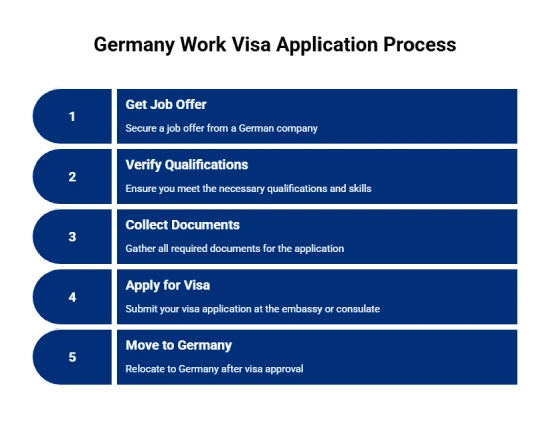
Germany Work Visa Processing Time
Detailed information about the Germany Work Visa processing time is given below.
| Visa Type | Processing Time |
|---|---|
| Skilled Worker Visa | 6 to 12 weeks |
| EU Blue Card | 2 to 3 months |
| Job Seeker Visa | 4 to 6 weeks |
| Freelance Visa | 6 to 8 weeks |
| Intra-Company Transfer Visa | 2 to 3 months |
Cost of Germany Work Visa
Detailed information about the application cost of Germany Work Visa is given below.
| Visa Type | Estimated Application Fee (EUR) |
|---|---|
| Skilled Worker Visa | €75 – €100 |
| EU Blue Card | €140 |
| Job Seeker Visa | €75 |
| Intra-Company Transfer Visa | €75 – €100 |
| Freelance Visa | €100 |
Benefits of Working in Germany
The benefits of working in Germany are given below.
- Competitive salaries in fields like engineering, IT, and healthcare.
- Access to healthcare and social security for everyone.
- Paid time off, including vacation days and holidays.
- A decent work-life balance with normal hours.
- Chance for permanent residency after five years on the job.
Tips for UAE-Based Applicants
- Get Your CV Ready: Make sure your CV fits the German job market.
- Learn Some German: Knowing the basics can be really helpful, especially if you're dealing with customers.
- Look Into Visa Options: Check out visas like the EU Blue Card or Skilled Worker Visa.
- Get a Head Start: Visa applications can take a while, so it’s good to plan early.
- Ask for Help: Talk to immigration experts to make the process easier.
How Can Y-Axis Help You?
Y-Axis provides helpful services for UAE professionals looking to work in Germany, including:
- Help with applying for different work visas.
- Support in finding jobs in popular fields like IT, healthcare, and engineering.
- Tips for improving your resume and preparing for interviews in the German job market.
- Assistance with paperwork and help once you arrive.
